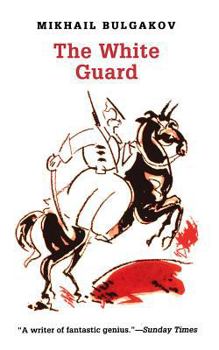White Guard the
Select Format
Select Condition 
Book Overview
Discover Mikhail Bugakov's classic literary love letter to the city of Kyiv. Drawing closely on Bulgakov's personal experiences of the horrors of civil war as a young doctor, The White Guard takes... This description may be from another edition of this product.
Format:Paperback
Language:English
ISBN:0897332466
ISBN13:9780897332460
Release Date:August 2005
Publisher:Chicago Review Press
Length:322 Pages
Weight:0.71 lbs.
Dimensions:0.8" x 5.0" x 8.1"
Customer Reviews
4 ratings
Stunning novel about a world coming apart forever
Published by Thriftbooks.com User , 21 years ago
While we are, as Americans, familiar with the story of the Stalinist purges and know something of post-Revolutionary Russian history, the Russian Civil War between the White and the Red is not as well-known.But this is the crux of the struggle that subsequently determined Russian history. Many authors tried to give a view of that turbulent period; Pasternak in "Doctor Zhivago", Solzhenitzen marginally in "Ivan Denisovitch" (Denisovitch was in a gulag because he was a returnee from the German front and thus viewed as a political traitor) and Ayn Rand "We the Living." Bulgakov's novel is one of the richest, most touching and well-written I have read on this historical time.He takes the story from the personal standpoint of a single family affected by the German betrayal of Russia to the incomprehensible brutality of the Civil War. The use of "white" and "red" as symbols in describing everyday objects and landscape is novelistic, the action is pure stage drama as you'd find in a play or film. This is a far better novel than "Doctor Zhivago", which dealt with essentially the same subject (families torn apart by the Civil War and their way of life forever altered.) If you are at all interested in Russian history, I can't recommend "The White Guard" enough to you. I just loved it.
A superior novel.
Published by Thriftbooks.com User , 23 years ago
Jacques Barzun in "From Dawn to Decadence" says that those who live in the midst of a Revolution often do not perceive the tidal wave of historical forces sweeping by them. Nonetheless, they are acutely conscious of being caught up in a whirlwind. In "The White Guard", the characters do not expound in depth about the loss of the old order or imminent rise of the new one. But they are terribly aware of the pain and upheaval that marks their daily lives. Nikolka, Alexi, and Elena Turbin are members of a middle-class family in Kiev. The time is 1918 and the Socialist Petlyura's army is outside the city. Nikolka, Alexi, and their friends go out from the warmth of their apartment to do their part to thwart his advance. However, the Germans, who were their erstwhile protectors, leave the city and are accompanied by the military and political leaders of Kiev. The Turbins and their friends feel betrayed. After a brave but futile defense the `officers' (synonymous with upper middle class) rip off their identifying markings and attempt to blend in with the populous at large. Looming in the background are the dreaded Bolsheviks and one gets the strong sense that the present troubles are but a hint of what is to come. However, this imminence is not apparent to the Turbins. They can neither glean nor control the inexorable flow of history. However, they can "Go on living...and be kind to one another...". The White Guard is a challenging but rewarding novel that, like much of great literature, exhorts the human spirit to persevere through trials and suffering. It's exposition is simple but every incident is dense with meaning. A superior novel.
A 1:30 AM "I can still read for fifteen more minutes" book
Published by Thriftbooks.com User , 24 years ago
I am also astounded that only three people reviewed this book. The novel centers on the Turbin family living in Kiev, Ukraine during the Civil War (1918 - 1921) that followed World War I and the Russian Revolution. After the Russian empire fell apart in 1917, the Ukraine declared an independent state in early 1918 led by a parliamentary leader called a Hetman. The Hetman Skoropadsky in The White Guard is the second such leader. Skoropadsky assumed power with German support and intervention. Having just lost World War I and being not all that interested in the Ukraine anyway, the Germans could not support Skoropadsky enough to quell the inevitable power struggle. In the Ukraine, there arose armies of Tsarists (led by Deniken, mentioned briefly in the book), Bolsheviks (who, of course, ultimately win but are not major players in the book), and Socialist nationalists led by Simon Petlyura. The Turbins enlist in a local guard unit supporting the Hetman against Petlyura's much larger army. It soon becomes clear that their loyalty to the Hetman is misplaced, but the Turbins' loyalty to each other, their city, their friends and neighbors, and their commanding officers is heart-warming. Besides "heart-warming" there are also running gun battles, sabre decapitations, machine gun ambushes, and enough action to please all but the most hard core testosterone addicts. Petlyura is regarded by many Ukrainians as a great general (no opinion from me), but many readers will enjoy despising Petlyura for the pogroms he instituted that killed 100,000 Ukrainian Jews. Petlyura is called a "dirty Yid" at a point in the book that might give insight into Bulgakov's view on these pogroms. This book is both a taut thriller and a beautiful story of loyalty and love. Brian says "Check it out" (Sorry, Joe Bob).
A tender and powerful book.
Published by Thriftbooks.com User , 25 years ago
I have to agree with the other person who reviewed the White Guard, this book is fantastic. The details of the conflict are indeed confusing, but one does not need in-depth knowledge of the Russian Revolution to appreciate this passionate narrative. I highly recommend it.






